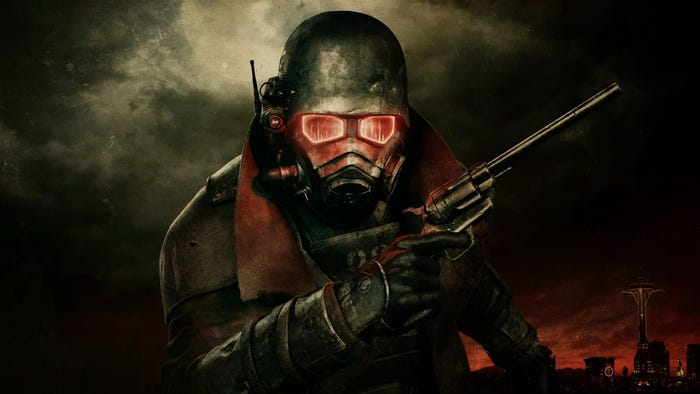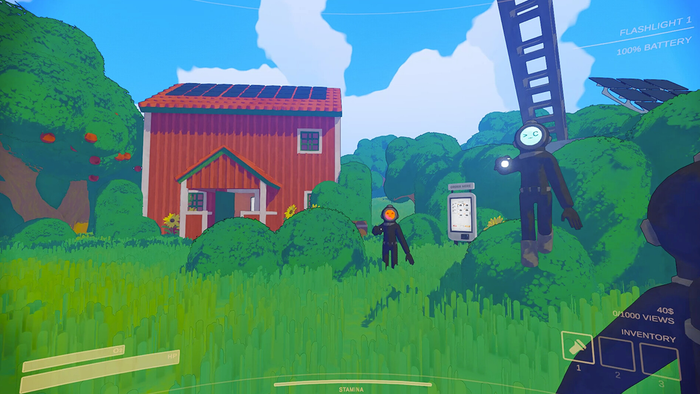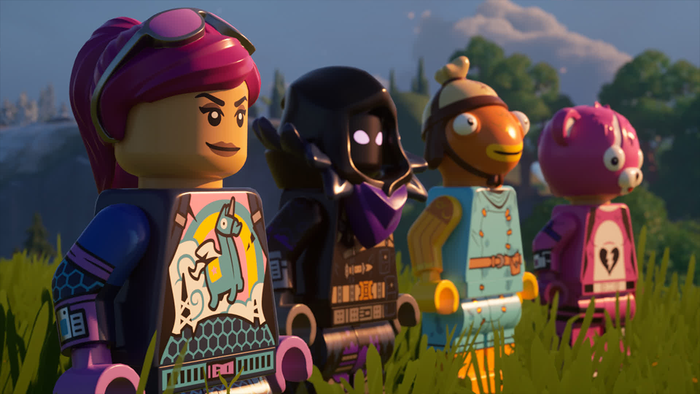In this reprinted <a href="http://altdevblogaday.com/">#altdevblogaday</a> opinion piece, Volition's senior audio designer Ariel Gross shares how his team handles the audio hiring process, what it takes to get hired, and more.

[In this reprinted #altdevblogaday opinion piece, Volition's senior audio designer Ariel Gross shares how his team handles the audio hiring process, what it takes to get hired, and more.] I keep writing and rewriting this blog. First it was going to be about our hiring process at Volition. Then it was going to be about what it takes to join the Volition audio team. Then it was going to be about a few things that I'm looking for in audio design candidates. Then it was going to be about some of the resumes that I've seen and explain how certain things do not qualify people to be in-house game audio designers. Then it was going to be about jerky things that I think developers do to applicants. I realized that I was doing that thing that I always do, which is spend an hour writing different titles for my blog, fantasize about the content, try to define the blog and what its importance was, and not get anywhere. This is one of my curses when it comes to blogging. And it's silly. So, now I'm just gonna write this thing. Screw it! I'm writing it! And it just going to be a big jumbled blog about all that stuff.
The Volition audio hiring process
I think it all really started with Anne. Anne is the project manager for audio at Volition. She's an innovator. I'd like to think that I am, too, but I'd rather someone else say it about me than to say it about myself. "I'm an innovator!" Sure ya are, buddy (wink-mouthclick-point). At the very least, I am an early adopter. So, with Anne and I working in the same department, experimentation can sometimes be the path of least resistance. (wink-mouthclick-point-jump-heelclick-belch) I don't know why I just wrote that. Anyway, we decided to put the audio hiring process up for discussion and change. We kept a central person to review all incoming applicants. That would be me. I'd scrap a bunch of incoming applicants because I could tell by reading the cover letter and resume that a person did not have the stuff. I will talk more about that later. If someone piqued my interest, I would pass their cover letter, resume, and demo materials along to the rest of the audio team. I'd get feedback and then decide if we wanted to proceed with the candidate to the next step. The next step would be some kind of test. Previously, we had sent out a written test that had a bunch of questions on it. Stuff like, what do you consider to be the three most important areas of sounds in an open world game? What do you think would be difficult about working on audio in an open world game? And if you had to design a beam weapon, how would you put it together both creatively and technically? And a bunch of other riddles and puzzles and noodle-ticklers that usually had no specific correct answer but plenty of potential incorrect or awkward answers. We decided to kill the written test. We had all taken similar written tests and decided that they were annoying and time consuming. Additionally, those are the types of things that we discuss on a daily basis within the group. If someone in the Volition audio team were to say, "I'd design a beam weapon as 330 one-shot sound effects of varying lengths," then one of us would say, "That seems like an odd approach," while cleaning up all the barf. Also, we could ask questions like that over the phone or in person and it would allow for some back-and-forth. Previously, if the applicant had gotten past the written test stage, they would go on to the video test. This is where we would send out a video capture of Red Faction: Guerrilla with the sound stripped out and would ask the applicant to replace the sounds with their own creations. This method is decent for exposing a candidate's sound design skill. They would need to design some weapons, some impacts, a vehicle engine, ambience… it would give us back a pretty good variety of sounds that would be relevant to their jobs. But there are some problems with that method. We do some linear work within the Volition audio team, but the vast majority of our work is non-linear. Also, it's easy to get caught up in the little gotchas, like, did they get every footstep? Did they notice that piece of metal in the distance falling over? Did they notice that the player is low on health in this section? And if we weren't really careful about it, we might be mentally dinging an otherwise awesome candidate because they missed that little visual cue, which again, would be something that could be addressed in a feedback session if they were working here. We also tended to get a lot of very similar results back. Also, it doesn't really give the candidate much of a chance to show us if they can get a point across or tell a story with sound, although that was partly because of the footage we would send. Byron had heard that some other companies were instead sending out a scenario that is written out in text. The candidate is asked to read the scenario and to then send back an audio file. That is, there is no video component to sync the audio to. There are some limitations, like how long they have to do it (two weeks) and the duration of the .wav file that they send back (60-120 seconds), but other than that, it's really up to the candidate to tell the story with their sounds. Not only does the candidate have more creative liberty, but they also get to completely control the pacing. They can tell a better story this way. So we did it. After getting a couple of these tests back, we decided that we were able to tell a lot more about our candidates than what we were able to tell from the video method. So, the new process to this point would be to look at the applicant's materials that they've sent, then pass along the good ones to the team for discussion, and then to send out this new test. If we liked their test, we'd schedule a phone interview. In the past, we had tried a couple different methods for the phone interview. The first method involved getting the entire audio team in a conference room and calling the poor applicant as a team. We would all go around the room asking questions off of a piece of paper. Lots of standard questions like, "Do you have any weaknesses? No? Okay, next question," and, "What's a game you think had cool sound? Saints Row? +10 points." It was too rigid and it didn't really give us a sense of who this person was. So, the pendulum swung to the complete other side and we went paperless and very spontaneous. One might say unprepared. But we were all still in the conference room. Like seven or eight people asking all sorts of disconnected questions, like, "What kind of music do you listen to," followed by, "How would you design a tool to implement ambience," followed by, "What's your favorite plug-in?" My opinion was that it was a complete mess, and although we sometimes would get a better sense of who this person was than with the worksheet full of standard interview questions, it was spotty at best. This time around, the phone interview was two people. I was in all the phone interviews and we rotated the other members of the audio team. We would meet for 15 minutes before the phone interview and toss around a few questions that we'd like to ask. Usually we would each have around five questions that we wanted to ask, and the rest of the time was left open for banter and rambling. Banter and rambling actually means a lot to me. I want to know how this person banters and rambles. In the end, I'd say that it went the best that it has ever gone. There are probably ways to improve the process, but it worked out better than anything before. At this point, after the application process, the test, and the phone interview, we had a pretty good sense of this person. There was just one last test to go. The on-site interview. To me, the on-site interview has a primary purpose, which is that I want to see how well this person is going to fit in with the team. I already know that this person is qualified or they wouldn't get to this point. So, for the on-site, I just want to be able to predict whether or not I want to work with this person day in and day out. But there are lots of other things that we can find out during the on-site. When the candidate shows up for their on-site, the first thing we do is gather up the audio team and a few other relevant people and listen to the candidate's test a couple of times with the candidate in the room. Then we start the critique. I find that it's actually pretty tricky, because the candidate wouldn't be sitting in a Volition conference room if their test was bad. My favorite question that I heard asked was, "If the tables were turned and you had to critique this test, what criticism would you have?" This was followed by, "Now respond to your own criticism." We would also pick a section and say, "What would you do to make this section more realistic?" This would be followed by, "Okay, same section, but how would you make it funnier?" The responses to the questions isn't really the point to me, anyway. So, it doesn't really matter what we criticize. We do this because we want to know how the person reacts to feedback. Do they get defensive? Do they struggle with coming up with new approaches? Do they clam up and seem defeated? I personally give the candidate lots of slack, too, since they're in the hot seat for a job that they presumably want really badly. After the critique, they get a little face time with me and our audio programmer and we tend to ask more technical questions. I want to get a better sense of whether this person has serious technical chops or if they are more of a content creator. Or maybe both. This is followed by some show n' tell of what we're working on. We take them into one of our offices and just play the game. We talk about what we're working on, what gets us excited about the project, we play the game in front of them, and we check out their reaction. We usually get some good questions from the candidate at this point in the process. The questions that they ask during the show n' tell of the game give me an indication of where their head is at, what they're most interested in, stuff like that. Then it's lunch with the audio team. Lunch is important. This is the first chance that we have to see how the candidate behaves with the audio team in a more social setting. We're not in the office. We're not sitting in front of a computer. We're not grilling the person. We continue to ask questions, but they're social ones. Anne likes to ask questions like, "What would you be leaving behind if you were to move here?" And I tend to ask stuff like, "What kind of music do you listen to?" More personal questions. It tells me a lot about the candidate. It's also a chance to reset the candidate and get them ready for what's coming next. After lunch, we have an interview gauntlet. Three hours of interviews with people from the audio team as well as people from production, studio management, writing, design, and whoever else we think would be able to give us an interesting perspective on this person. This is probably the most stressful part of the on-site. After this, it's usually around 4:30pm, and the candidate is probably like, "I need a drink." Which is exactly what we do. It was Anne's idea and it has proved to be another great one. We have formalized drinks as the way that we end our on-site interview process. We promptly head out to a local bar and have beers for two hours. I find this to be the most interesting part of the on-site because once you get a beer or two into someone, especially after an extremely stressful day, they tend to open up. To me, this is an essential part of the interview process because we start to see who this person really is. After that, they go home and we make a decision in the following days. If you've read this far, well, I've just barely gotten started! Sorry boutcha! I haven't blogged in a couple of months and I have all this crap rattling around in the ol' fleshy hat rack.
What it takes to work with us
If you're applying to join Team Audio at Volition, your odds of actually joining us are very low. It doesn't matter if you're straight out of school or if you've been in the industry for 20 years, the odds are still very low. It doesn't matter if you've never worked on a game before or if you have 20 games under your belt. Still low. For this round of hiring, we had 64 applicants that made it through HR and landed on the network for me to check out. That's the lowest that I've seen since I've been here, and it's probably because we didn't post the job to Gamasutra or other job sites. Typically we have well over 100, but for what I'm about to say, let's go with 64. Out of these 64, we had on-sites for three of them. Of those three, we hired two. So, purely looking at the numbers, without taking anything else into account, if you applied, you had around a 4 percent chance of getting an on-site interview, and around a 3 percent chance of getting hired. So, I would call that a pretty small chance. I'm assuming that I did the math right, there. I think I did. I want to add that the people that we hired didn't really have experience as in-house game audio designers. We were able to hire senior guys if we wanted to, but we didn't. And I also want to add that we had senior candidates apply. Lots of them. Full on industry vets that were more than qualified for the job requirements that we posted. But we went with guys that had way less comparable experience. And I'll also mention that we had that same criteria of experience and shipped titles on our job listing. So, why would we hire guys that didn't have a ton of experience? It's because that stuff isn't all that matters to us. And I think it matters a lot less to people like me who are in the position to hire other people than many might think. In fact, if you're out there publicly complaining about the catch-22 of needing experience before getting an entry-level job, I think you're looking at it from the wrong angle. Also, I might see you doing that, and as someone who gives people a chance, that might annoy me. Just sayin'! And believe me, I understand how you could see things this way. I was in your shoes not too long ago. I remember sending my resume and demo materials to over 100 developers before Volition saw my potential and hired me. And I had experience and titles! And even then, they didn't really know what I was capable of until I had been working there for a while. And that's kinda the point. We can research you and check out your previous projects and watch your demo and talk to you on the phone and even meet you in person at the on-site and we really don't know what we're getting until you've been working here for a while. And I realize this. I'd like to think that most people in my position realize this. Which is why many of us are looking for something that can't really be articulated very easily. Yes, we want to see an awesome demo reel. Yep, it would be great if you've got some experience. But there are things that mean way more to me than that stuff. I'm going to give you three things that I think are more important than all that other stuff. First of all, I want to see that you have a purpose for wanting this job. Not what you're doing (e.g. your resume and demo). Not how you're doing it (e.g. your web site or blogs that show how you do what you do). But why you're doing it. That's tougher to show me. I realize this. But people have managed to do it. It's in the tone of your presence on the Internet and in person. It's written between the lines in the e-mails that you send me. It's hidden in something you wrote on Twitter or on a comment on a Gamasutra article. It's the sound of your voice and the look in your eyes when we're talking in person. And if you're starting to think this is unfair because it requires you to be active in some community that I'm a part of, then there's one glorious place where you're assured that I will see it no matter what. That is your cover letter. You should see the look on peoples' faces when I tell them that I often get more out of a cover letter than a resume or a demo. But sometimes I do. That's your shot at showing me that you have a purpose. Secondly, I want to see the potential for growth. It doesn't matter if you've been around the block, either. There are as many titans of the game audio industry as there are newbies who realize that this field changes so quickly that you still need to be able to grow and change. If you think you have figured this whole game audio thing out, well, there might still be somewhere out there for you, but it's not Team Audio at Volition. I see this as going hand-in-hand with some other important qualities, like humility, a good sense of humor about yourself and your work, and the ability to take feedback. I wrap it all up in this thing that I call potential for growth. And thirdly, I want to see that there's more to you than audio. Team Audio at Volition tries to look at each other as complete human beings. We can all design and implement audio. But that's not all there is to it, not by a long shot. There's so much more to being part of this game development team than being a good audio designer or than knowing how to make things sound right in Wwise. Maybe you have some game design sensibilities. Maybe you're able to make people laugh. Maybe you play an instrument. Maybe you know how to read a schematic. Maybe you're good at making a point. Maybe you're a futurist. Maybe you like to take random online classes. Maybe you like to put together puzzles. It doesn't matter. I'm not just trying to look at you as an audio designer, I'm trying to look at you as a complete human being. The bigger picture I can see, the most interested I may become.
One swallow does not a summer make
After looking at so many audio applicants since being at Volition, even the most recent time, when there is more information about what it takes to get an in-house audio job out there than ever before, it has become apparent that some people still don't understand the breadth of knowledge and skill that it takes to get an in-house audio gig at Volition. I see a lot of applicants applying who have experience in some form of broadcast media. This is relevant, don't get me wrong. There are things that you could learn at these places that might give you some skills that would apply to the work that we do. But if this is all you got, then it's probable that you will be outgunned even for an entry-level position. I see a lot of applicants applying who emphasize that they are musicians or composers. This is also relevant. But if that's all you got, you'll be outgunned. I see a lot of applicants coming from advertising. Again, relevant. All you got? Outgunned. Lots of applicants coming from good schools. That's it? Outgunned. Theater audio? Outgunned. Live sound? Outgunned. Worked on a mod? Outgunned. Helped engineer at a recording studio? Outgunned. VO recording and editorial? Outgunned. However, if you've done several of these things… I'm interested. You may or may not have noticed that this person hasn't shipped a game or held an in-house audio position at a game developer. But what this person at least appears to have done is, well, a lot. They've done a lot. Even though they haven't shipped a game, they're interesting to me. If their cover letter and demo is good, they're on the path to an interview. People like this definitely exist and they're itching to get into game audio. Now, if someone has shipped a game or two, has a solid demo reel, has some knowledge of how audio works in games, and also has a good cover letter and resume, they are definitely going to give this other person a run for their money. But that doesn't automatically mean that they'll get the job. If you read everything else I wrote above, there's a lot of stuff that means a lot to me other than what someone has done in their past. The reason I started this section with one swallow does not a summer make is because there are people out there who have dedicated huge amounts of effort to getting a job in game audio. Huge amounts of effort. Can't understate that. That's what it takes. And like I said earlier, if you've got other skills that make you valuable, like knowing how to script, or knowing how to solve complex problems, or knowing how to build a synthesizer, or knowing how memory and streaming work, or knowing how to build a level in Hammer, or know how to recount something that happened to you in a compelling way, well, that is awesome, because that sounds like someone I might want to work with. So, be honest about where you're at and try to keep things in perspective. If you've applied to 100 game audio jobs and haven't found one yet, take some time to think critically about yourself and what you bring to the table. Think about what you could do, what you could learn, who you could learn from, what it might take to make you someone who a company must hire. Then go do that stuff. There are a lot of people out there already doing it. But don't let that discourage you. None of them are you and they can never be you.
Jerk move, potential employer. Jerk move.
Okay, this is the last thing I want to write about. Why are developers being so jerky to their applicants. Do these people not realize or remember what it's like to be an applicant? My friend Dave Samuel, a kick ass VFX artist, put it this way, and I'll never forget. When you're applying for jobs, a minute is like an hour, an hour is like a day, a day is like a week, a week is like a month, and a month is like ten years. These people are in agony, waiting with bated breath to hear back from you. It's way better to get a rejection quickly than to be strung along for who-knows-how-long. Stringing people along is lame. I'm guilty of it, too. Nobody's perfect. But I'm trying to get better. Try to tell your applicants how long it's really going to take to get them moving to the next step. If you're rejecting someone, you can leave the door open. Sometimes your rejection letters can make people think that they will never have another shot at working there again. If that's the case, well, okay then, I guess. But is it the case? Not as far as I'm concerned. The door is always open to reapply. The door is always open to talk to me. Even after I've rejected you. In fact, if I reject someone and they keep in touch, I see that as a good thing. It seems like a mature and smart thing to do. Also, give you applicants your direct work e-mail address if you can. If you can't give them that for some dumb reason, give them your home e-mail. Let them contact you. Encourage them to stay in touch. Build that relationship. It might turn into something amazing. Don't screw up HR, talk to your HR department about it first, but probably you can keep in touch with these people. Before you hang up the phone from the phone interview, or after the on-site interview, tell the applicants that they should not hesitate to contact you if they want an update or for any reason. Remember, they're going to be biting their fingernails off and dreaming about your response. They probably have diarrhea from all the stress. Even if they know first hand that this process can take a really long time, it doesn't make it any less nerve-wracking. There's no reason to leave these people thinking that they'll botch everything if they ask you what's going on or if there's any news. And if they do ask you for an update, be straight up with them. It's okay to say that there are other applicants and that you can't decide yet, or that the team has been too busy to make a decision, although if that's the case, then that's kind of annoying and you should probably consider addressing that. Just remember that you're dealing with a human being. Someone who you could potentially be working with, or someday this person might be looking at your application. Who knows? There are all the reasons in the world to treat these people like you'd like to be treated. If you have the power to make or break someone's dreams, then wield that power like a kind and honorable king. I believe it's the right thing to do.
The end
Alright, that's a bunch of stuff. I feel like I've said my piece a few times over. If you actually read all of this, you should leave a comment or send me an e-mail or something. I'm impressed that you, or anyone, would read these ramblings. And that's just what these are. Ramblings. Try not to take them too seriously. I'm just some schmuck. On that note, I'd also like to point out that these are my opinions and mine alone. These opinions do not reflect Volition's official positions, or the Volition audio team's official positions, or THQ's official positions, or the FLOTUS's official opinions, or any other silly ideas that you might get in your head. Honestly they probably won't even reflect my own opinions in a few months. Also: no bologna this time. Sorry. Except for that one that I just wrote. And this one: bologna. [This piece was reprinted from #AltDevBlogADay, a shared blog initiative started by @mike_acton devoted to giving game developers of all disciplines a place to motivate each other to write regularly about their personal game development passions.]
About the Author(s)
You May Also Like








